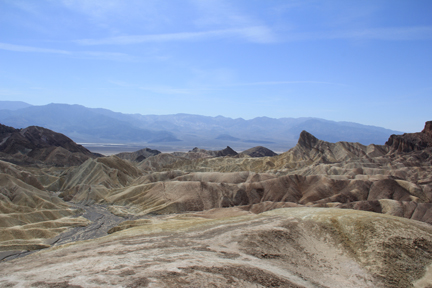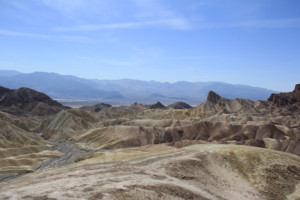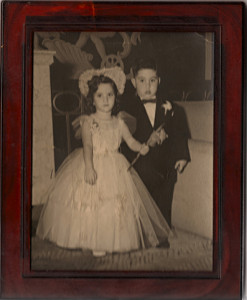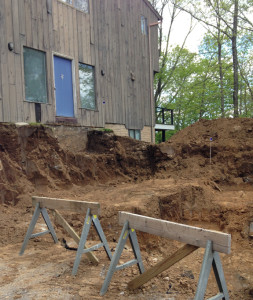
Below the front door to my house is a large dirt pit, the first stage in the repair and redesign of the steps leading up to the entrance. This is what I arrived home to after a long weekend with my daughter in southern California, followed immediately by a trip to Ohio for the funeral of a dear cousin.
The hole in my heart finds some perverse comfort in the hole I’m staring down at.
In Buddha’s Brain, a book that brings neuroscience into the meditation equation, Rick Hanson tells me that “the brain is like Velcro for negative experiences and Teflon for positive ones—even though most experiences are probably neutral or positive.” It has something to do with survival strategies and the way the brain processes them. For all that it contains and controls, the brain is not a computer. What it retains in memory is the essence of an experience, not every little detail. I see the Velcro/Teflon analogy in more linguistic terms: the word “sorrow,” the very sound of it, carries a weight; joy is like a bubble.
The poet Yehuda Amichai puts it this way in his poem, “The Precision of Pain and the Blurriness of Joy”:
. . . . I’m thinking how precise people are when they describe their pain in a doctor’s office.
This one’s a throbbing pain, that one’s a wrenching pain,
This one gnaws, that one burns . . . .
. . . . Joy blurs everthing . . . . Even the spaceman who floated in outer space, tethered to a spaceship, could say only, ‘Great, wonderful. I have no words.’”
I have words—wonderful ones—for the extraordinary vistas I took in during a road trip (six hours) to Death Valley with my daughter.  Not to mention the gift of uninterrupted time spent with her. We were cruising in her spiffy new car, bright blue, state-of-the-art sound system, her music mostly. On the way back to L.A. we hit a sandstorm. Wind kicking up, sand blasting the windshield. You do your best to keep the car steady. You slow down till the squall passes.
Not to mention the gift of uninterrupted time spent with her. We were cruising in her spiffy new car, bright blue, state-of-the-art sound system, her music mostly. On the way back to L.A. we hit a sandstorm. Wind kicking up, sand blasting the windshield. You do your best to keep the car steady. You slow down till the squall passes.
The days in L.A. following the overnight in Death Valley are far from a blur: a spinning class on Mother’s Day; brunch at a Mexican restaurant in Santa Monica; dinner, home-cooked, with friends, and a movie, Frozen. Shopping. Drinks and light bites with another friend on the last night of my mini-vacation. Happy Hour was all the more joyful for not even hearing my cell phone ring. Later that night I would learn that my oldest cousin had died. My daughter got it right when she said to her friend that I’d fall apart on the flight back to New York. Within twelve hours of landing, I’d be on another road trip (seven hours, no traffic), this one with my brother and a cousin.
Weeks later, the dust begins to settle and I look back at how much terrain—literally and emotionally—I covered in a short space of time. I think of my daughter’s words in her last post re: how little is in our control. A joyful weekend—the first Mother’s Day in several years I would spend with my daughter—is punctuated by a freakish act of Mother Nature (that has my daughter doing her best not to freak out about the possibility of increased insurance premiums) and a death in the family.
The dust settles a bit more. I like to think that my daughter’s new job, more in keeping with her career goals, takes a little edge off the fact that the beautiful new car is still in the body shop. Yes, it’s just a car. And there was no collision, which, in sunny (dusty) California means no increase in premiums. Most important, we weren’t hurt.
 But the car was barely a week old. And, yes, that hurts. Irony plays it hand, again and again. Who knows what might have happened had we driven the old, ailing Jetta? You can go for miles in Death Valley without passing another car. And cell phone service is not something you can count on at sea level and below.
But the car was barely a week old. And, yes, that hurts. Irony plays it hand, again and again. Who knows what might have happened had we driven the old, ailing Jetta? You can go for miles in Death Valley without passing another car. And cell phone service is not something you can count on at sea level and below.
My cousin, almost as close as a brother when we were young, is gone. The passage of time may change the nature of relationships, keep us from sentimentalizing a past that has no real place in our present; but that thing called love, when it’s deep, is outside of time, in a place where pain, in all its precision, finds some respite in the blurriness of joy.



